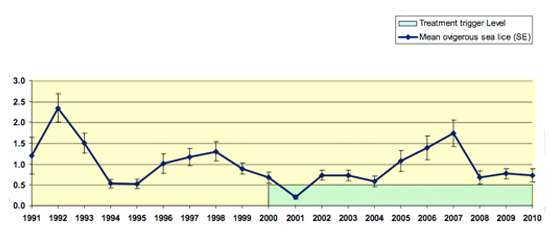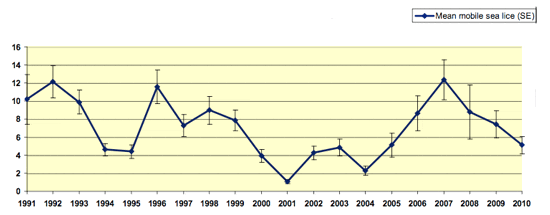National Implementation Group Report on 'A strategy for improved pest control on Irish salmon farms'
The National Implementation Group was set up in December 2008 to oversee and evaluate progress on the implementation of the National Pest Management Strategy for the control of sea lice on offshore salmon farms. The group met on five occasions between December 2008 and June 2009 and recommended that progress on further implementation of the strategy be overseen up to and including the spring period 2010.
The remit of the group was to assess the situation on the ground, report to the Minister on progress made to reduce sea lice levels on farmed salmon and recommend further steps required.
The Group found that since the introduction of the new Pest Management strategy there has been a sustained reduction in the level of ovigerous lice on farms in spring (Fig. 1).
Ovigerous Sea lice levels Nationally (May)

Mobile Sea lice levels Nationally (May)

There has also been a sustained incremental improvement in overall levels of lice infestation on farms (Fig. 2) during the spring period. The review of lice infestation data showed that this progress has been made particularly during the critical spring period and at a range of sites in all salmon farming areas. It also demonstrated that these improvements were not achieved by an increased level of treatment but rather by a combination of consistent application of appropriate husbandry techniques, combined with bay management approaches and carefully chosen application of appropriate treatments using best practice.
Recommendations:
The group made a series of thirteen recommendations to underpin the progress made to date and to ensure that obstacles to further progress are removed or mitigated in so far as possible.
- The Marine Institute & the relevant Veterinary practitioners engage with DAFF to review the scope for increasing the availability of appropriate medicines.
- That the industry with the regulatory authorities support the development of protocols to optimise the use of Hydrogen Peroxide and other bath treatments, strategic treatments and product rotation.
- Where formal veterinary advice has been given to the effect that on balance and taking into account the welfare of the stock, the principles of integrated pest management and the potential for cross infection of other stocks, both wild and farmed, it is not advisable to treat stocks of large fish and/or fish due for imminent harvest that the requirement to carry out mandatory treatments would be waived. This would be done on a case by case basis and after examination by the Management Cell.
- That industry through better coordination and with support from the Marine Institute encourage access to well boats, disinfection and training.
- That the industry in cooperation with the Marine Institute monitor the use of the new Pancreas Disease vaccine.
- . That adherence to an agreed SBM Plan should be a condition of future licences.
- That SBM principles and the provisions of Monitoring Protocol No 3 on Sea Lice Monitoring and Control be applied at all sites including provisions relating to separation of generations and fallowing.
- That all Salmon Farms should submit a Business Management Plan (in accordance with SBM requirements).
- That DAFF facilitate bay wide fallowing by prioritising where possible relevant licence applications.
- That the Management Cell approach be extended to all regions.
- That the Monitoring Regime and Pest Control Strategy be further developed to accommodate the growing trend towards organic farming.
- That a Regional Management Plan for Connemara be drafted by industry with the assistance of the Marine Institute. The Plan should provide for the separation of generations and fallowing on a regional basis.
- That the National Implementation Group chaired by the DAFF and representing BIM, Marine Institute, Veterinary and Industry interests continue to monitor the implementation of the Pest Control Strategy.
Further Reading
| - | You can view the full report by clicking here. |


